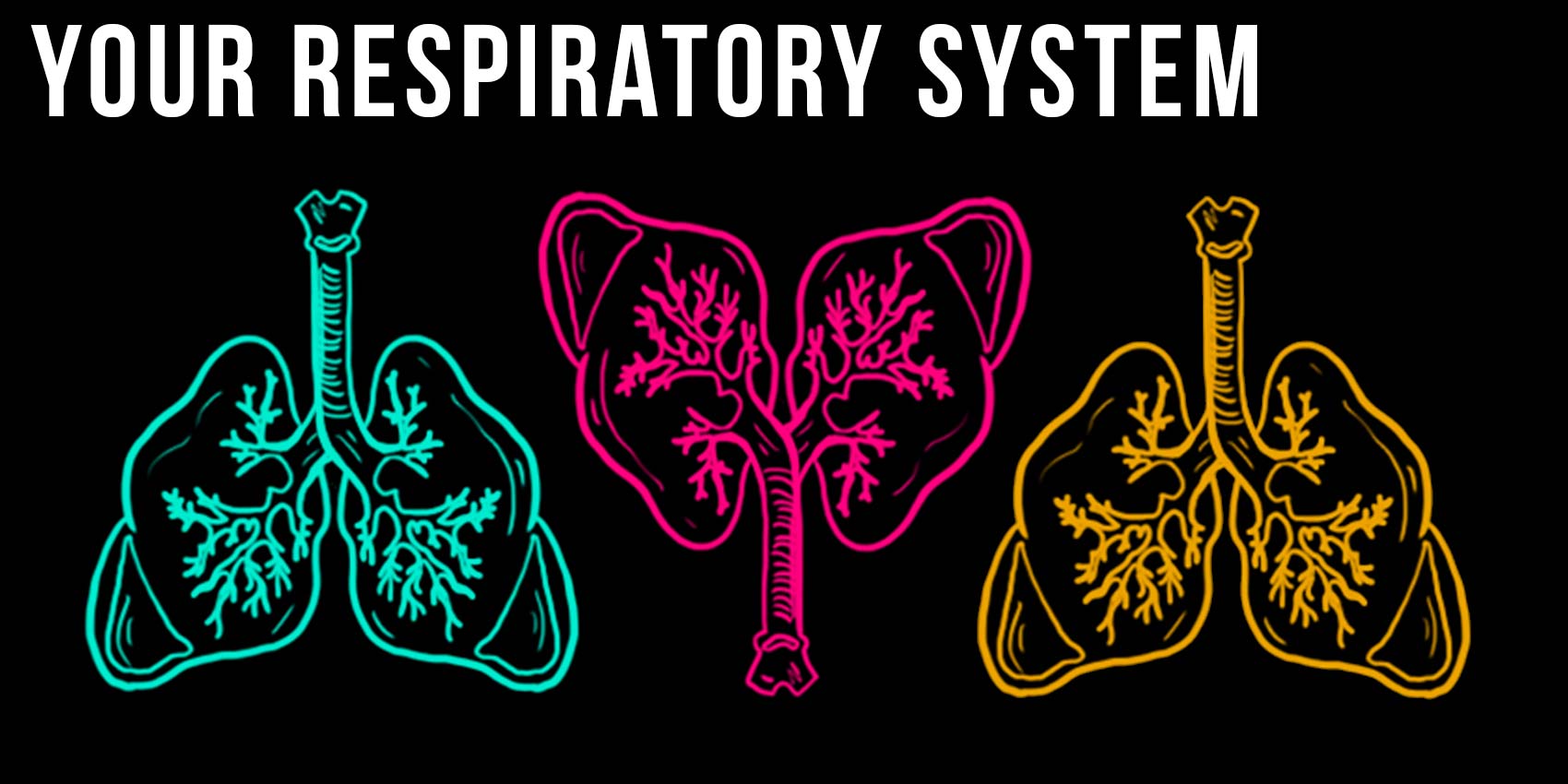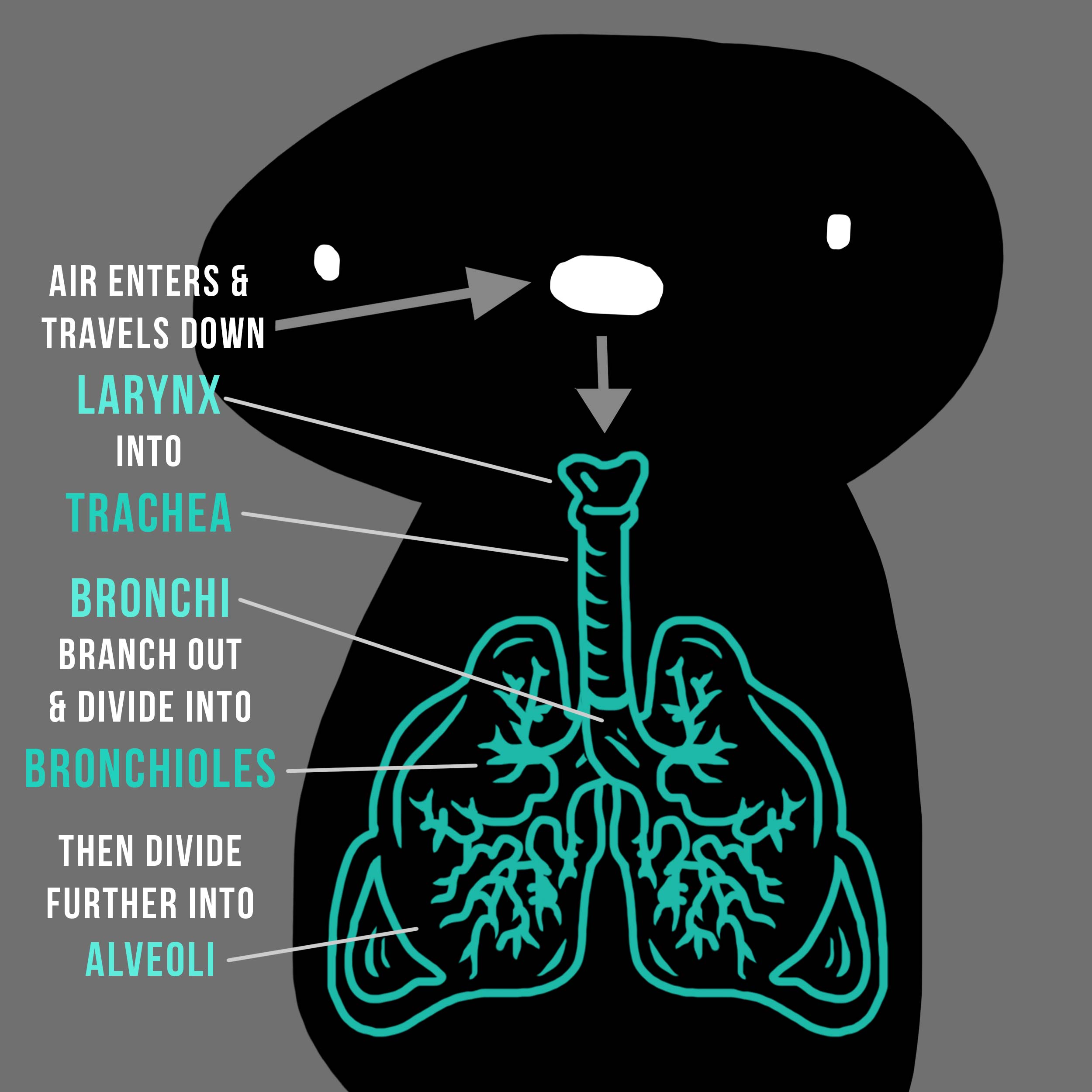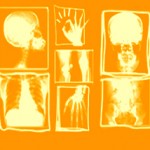10 Nov Your respiratory system

Your Respiratory System simply put, is the system that helps you breathe. It is made up of the mouth, nose, larynx, pharynx, trachea, lungs, heart, ribs and diaphragm. The main role of this system is to take in oxygen (needed by our cells to live) and get rid of carbon dioxide (the waste gas that cells make). Basically the respiratory system is a giant gas exchange mechanism!
Take in oxygen: get rid of carbon dioxide. Yes, it’s that simple.

DID YOU KNOW? A newborn baby’s average breathing rate is about 40x a minute (lowering to 20 when sleeping). Adults breathe about 12-16 breaths a minute.
(Source: https://www.livescience.com/22616-respiratory-system.html)
Breathe:
Your diaphragm is a muscle that separates your chest from your stomach. (In technical terms, it separates your thoracic cavity which is comprised of your heart, lungs and ribs, from your abdominal cavity, which is full of your tummy stuff – oops, that wasn’t totally technical, was it?) It helps you breathe by moving up and down, sending air in and out of the lungs. So, it is the “engine” that initiates your breathing. Let’s look at the journey air then takes in the body.

DID YOU KNOW? Hiccups are caused by a spasm of your diaphragm, stimulated by a nerve that runs through your rib cage. The characteristic sound of the hiccup comes from the diaphragm forcing the air in abruptly and then the closing of your vocal cords. What causes hiccups? Drinking carbonated drinks and eating too fast are two common causes.
(Source: https://www.webmd.com/digestive-disorders/why-do-i-hiccup#1)

Breathe deeper
Air enters your oral cavity (your mouth) or your nasal cavity and then travels down your larynx (in your neck), enters your trachea (base of your neck to your sternum) and then splits in two directions of your lungs: the bronchi. The bronchi then branch out and divide into bronchioles, which branch out more and divide more again, to reach the alveoli, the thin-walled sacs where the vital exchange of oxygen and carbon dioxide actually takes place.

DID YOU KNOW? Your bronchi are covered with mucus (don’t say ew! just yet). The mucus is actually important because it prevents toxins from invading the organ that it surrounds—in this case the lungs.
In the alveoli, oxygen becomes available to your body. Red blood cells stopping by the alveoli take in oxygen and transfer out carbon dioxide (and other toxins). When you breathe out, you exhale carbon dioxide, which is now filled with the toxins that your blood carried to your lungs. Then you breathe in again (hopefully!!!) and the whole air journey happens again.
FYI, the whole reason your breathing increases when you exercise or do hard labor is that your cells in your muscles need more oxygen to perform that work. So, your heart beats faster to circulate the blood more rapidly and you breathe faster to bring in oxygen faster since all that blood is moving faster to supply the cells in your muscles with oxygen!

DID YOU KNOW? The brain can only survive for about 6 minutes without oxygen. Hypoxia is when the brain is getting too little oxygen, anoxia is when the brain is not getting any oxygen at all.
(Source: https://science.howstuffworks.com/life/inside-the-mind/human-brain/brain-death1.htm and https://www.livescience.com/22616-respiratory-system.html)
What role do the ribs play in the respiratory system? Your rib cage protects your lungs and expands with each breath you take. Pretty cool.

DID YOU KNOW? Every time you breathe in you tap into the sympathetic nervous system (fight or flight). Think about it…. breathing in is like gasping, it’s our way of preparing our system for flight or flight. It brings oxygen to our muscles and needed blood cells for other combat missions. But when we breathe out, we alert the parasympathetic nervous system (rest and relax). Like breathing a sigh of relief is an exhale, not an inhale. This is why focusing on breathing, especially a long exhale is part of mindfulness and yoga and deep breathing, stress-stress-relieving, mind-chilling exercises. Pretty cool, eh?




Post Question:
Are you mindful of your breathing? Do you ever slow down just to take a deep breath? Tell us when and why you might do that.
Answer the post question here
What's being said